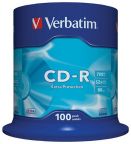Blank CDs, DVDs & Blu-Ray Disks
CD-skivor, eller kompaktskivor, är ett mångsidigt datalagringsmedium. Tomma CD-skivor är utformade för att användas med CD-brännare för att kopiera information från en datorenhet till ett fysiskt medium. Tomma CD-skivor används också i massproduktion med kommersiella brännare för att släppa identiska produkter på konsumentmarknaden. Till skillnad från DVD-R-skivor är CD-skivor inte ett optiskt medium och har en jämförelsevis begränsad datakapacitet. Därför används de vanligtvis endast för ljud och fildata. De flesta DVD-spelare är optimerade för DVD-skivor och kan därför inte läsa CD-format. Tomma CD-skivor finns i två specifika typer, som är CD-R och CD-RW. CD-RW är återskrivbara och kan därför användas om och om igen. CD-R-skivor är inte återskrivbara och kan inte raderas och skrivas om.
Tomma DVD-skivor
DVD-skivor (Digital Versatile Discs) är kompaktskivor utformade för att lagra olika typer av data som video, ljud och multimediafiler. Tomma DVD-skivor liknar tomma CD-skivor men med högre lagringskapacitet, de kan rymma upp till 13 gånger mer information än en standard-CD. Skillnaden mellan R och RW är att DVD-R är en skrivbar skiva för engångsbruk medan DVD-RW är en återskrivbar skiva. Förpackningar med tomma DVD-skivor levereras vanligtvis på en spindel eller i ett jewelcase.
Tomma Blu-ray-skivor
Blu-ray-skivor (BD) är ett digitalt optiskt skivdatalagringformat. Skivorna utformades för att ersätta DVD-formatet och öka lagringskapaciteten, vilket möjliggör lagring av timmar av video i hög upplösning och ultraupplösning. Den huvudsakliga användningen av tomma Blu-ray-skivor är för videomaterial som långfilmer och för fysisk distribution av videospel till spelkonsoler.












